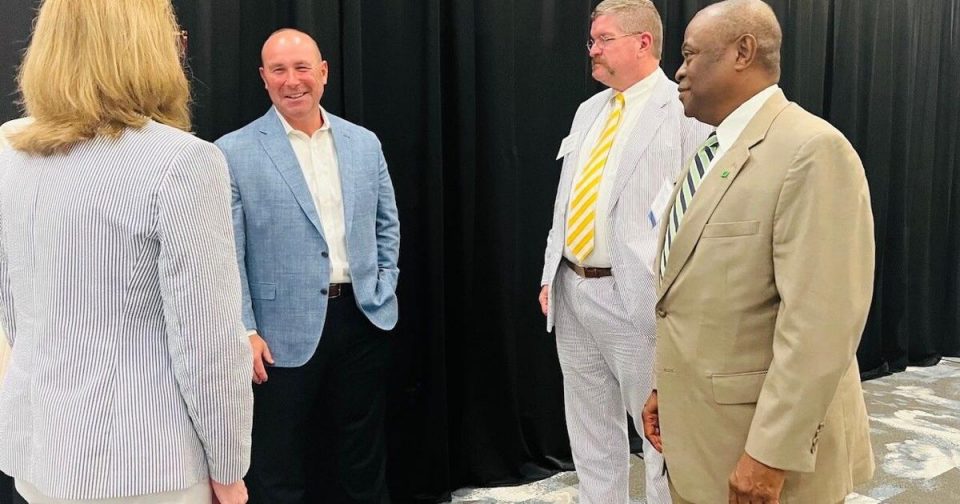Discussion at the August 30 Annual Industry Appreciation Luncheon, hosted by Greater Summerville/Dorchester Chamber in partnership with Dorchester County Economic Development, took on the issues and challenges of global supply chains facing area businesses.
The event, presented by TD Bank, attracted an audience of business and industry leaders who heard from keynote speaker, Jonathan Dawley, President and CEO of KION North America Corporation, and John Truluck, Director of Dorchester County Economic Development. This year’s luncheon was held at the Lowcountry Conference Center in Nexton.
The program focused on global business issues and how they have and may continue to impact business in the Summerville/Tri-county region.
Dawley spoke to the group about significant changes to KION’s business model following the pandemic and in response to geopolitical tensions abroad, resulting in strategies that include different raw material sourcing, expanding automation for customers and better supply chain options. Their goal is to insulate the organization from another supply chain crisis. KION works in the transportation and material handling equipment market.
Coming out of the COVID pandemic, KION has seen some of the supply issues alleviated with Chinese imports. But now difficulties in obtaining materials from Europe have surfaced partially due to the war between Russia and Ukraine.
Looking for ways to reduce global reliance and access ways to insource work and supplies, KION is moving more assembly in house. In May 2020, 30 percent of the company’s products were made in Summerville, but with the global supply chain challenges, it has shifted much of its work to the United States. These efforts mean more flexibility with production and better delivery times to their customers, according to Dawley. While the company has seen savings on tariffs and logistics, the changes have resulted in higher labor costs. Nevertheless, the move has been lucrative for the business overall.
In preparation of moving some manufacturing from Europe, KION is expanding into a new 250,000 square feet facility, representing a $20 million investment in Dorchester County. The automated facility will be run by robots with full production expected by the middle of next year. Hiring to operate the facility will begin in the near future, according to Dawley.
KION is facing many of the same workforce challenges business at every level are dealing with. Those include finding employees, keeping employees engaged, finding housing that is affordable, creating a purposeful culture, and addressing employee wellbeing.
The company has continued to grow with orders coming in. A backlog $80 million in 2020 now sits at a projected $600 million by the end of the year. The company doubled operations staff in Q4 of 2021. “Keeping the supply chain moving is key to fulfilling orders,” said Dawley.
KION’s responses to current global supply chain challenges are examples of strategies afoot across the country to keep the supply chain of materials moving while attempting to reduce uncertainty and risk.
Truluck has also reflected on Dorchester County’s supply and distribution issues.
“We deal with a world-wide economy and have a lot of international companies here in Dorchester County. Geopolitical issues have huge impact,” said Truluck, citing trade war with China, the war between Russia and Ukraine and huge energy cost hikes in Europe.
Factories and businesses have had to adjust to increased costs — and significant delays in delivery of materials. “All of this creates disruption and uncertainty,” said Truluck. “So what once was a world supply chain, we now see going back the other way and becoming more of a regional supply chain in order to reduce risk. If you’re looking at a world-wide supply chain, any event anywhere could impact you. If you pull back to a more regional chain, it lessens that.”
Many companies that moved manufacturing abroad for cheaper materials and labor are returning operations to the U.S. due to increases in shipping, distribution and lost time due to unavailability of products. Many European and Asian companies that export to the U.S. are now desirous of moving their manufacturing operations here.
Regarding delays in accessing materials, Truluck says there is more demand than there is supply. “We’re buying and consuming more. The pandemic was an unprecedented event whereby production was paused. Most recessions see drop off and gradual recovery. We saw a drop of and a quick bounce-back, but when you turn off production, you can’t just turn it back on immediately; the impact is felt like aftershocks of an earthquake. Disruption of supply chain causes pent-up demand, said Truluck.”
Dorchester County is home to numerous automotive companies, boat manufacturing companies and building and construction firms, all feeling the effects of extremely long lead times for the delivery of materials. “What they used to get in a matter of weeks, now may take half a year or a year,” said Truluck.
Dawley joined the KION Group from Putzmeister Holding GmbH, a subsidiary of Sany Heavy Industry Corporation, where he was head of the Americas region for over two years. Truluck has been in his position with Dorchester County Economic Development since 2014.


